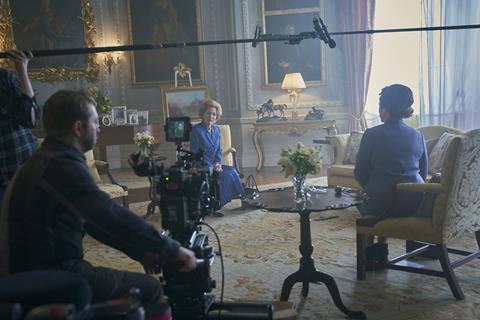
The UK is to reform its film and TV tax reliefs, introducing new expenditure credits with a headline rate of 34% for films and high-end TV programmes and 39% for animations and children’s TV programmes, the government has clarified.
The reform will change the way relief is calculated.
The expenditure credits will be calculated directly from qualifying expenditure instead of being an adjustment to the company’s taxable profit as under the existing regime.
Known as the Audio-Visual Expenditure Credit (AVEC), the new system will be modelled on government’s existing Research and Development Expenditure Credits.
At the time of writing, it is not yet clear whether the reforms will deliver a significant increase in tax relief for productions. The current tax credit for film and TV stands at 25%. It is expected it may be worth 25.5% under the reformed system.
The UK chancellor Jeremy Hunt announced the changes in his annual Budget to parliament today, saying he wanted to give ”even more momentum to this critical sector.”
He said: “I will introduce an expenditure credit with rate of 34% for film, high end television and video games and 39% for animation and children’s TV sectors.”
Hunt also pledged to maintain the high-end TV tax relief minimum expenditure threshold at £1m, allaying producer fears that it may be raised. The government is also reducing the minimum slot length required for a high-end TV programme to be eligible for a tax credit to 20 minutes, applied on an episode-by-episode basis. Previously, shorter episodes that were commissioned together could group up to meet the threshold for £1m average core spend per slot hour.
The government is also introducing a Video Games Expenditure Credit (VGEC) with a headline rate of 34%.
Both models will have an 80% cap on qualifying expenditure.
The Treasury said companies can claim expenditure credits from accounting periods on or after January 1 2024 and from April 1 2025, claims for new film and TV productions and games must be made under the expenditure credits system.
The government also plans to allow high-end documentaries to claim for relief. It will put a definition into legislation based on the following guidance by the British Film Institute: a factual or realistic programme based on real events, place or circumstances and intended to record or inform.
The changes follow a 12 week consultation into UK audiovisual tax reliefs that launched after the autumn 2022 budget, which covered the five existing reliefs: Film Tax Relief (FTR), High-End Television Tax Relief (HETV tax relief), Animation Tax Relief (ATR), Children’s TV Tax Relief (CTR) and Video Games Tax Relief (VGTR)
The first four will be merged into a single scheme, the Audio-visual Expenditure Credit, while the latter will become the Video Games Expenditure Credit.
A total of 63 written responses were submitted to the consultation and the government.
In his Budget speech, Hunt praised the film and TV industry as a major contributor to growth in the UK and noted that “only last month, Pinewood announced an expansion which will bring another 8,000 jobs to the UK.”
He said: “Our film and TV industry has become Europe’s largest with our creative industries growing at twice the rate of the economy.”
Elsewhere in his Budget, Hunt also said that he would extend the current 45% and 50% reliefs to theatres, orchestras and museums for another two years, saying they do “such a brillaint job of attracting tourists to London and the UK.”
Warm welcome
The British Film Institute (BFI) and the British Film Commission (BFC) expresed rellef the tax reliefs were being retained.
‘We welcome the Chancellor’s news today of the reformed Expenditure Credits across our screen industries, a testament to how crucial they are to the UK’s economy and growth,” said Ben Roberts, chief executive of the BFI. ” Combined with our extraordinary talent, infrastructure and technical and creative expertise the screen sector Tax Reliefs, now remodelled as Expenditure Credits, have super charged our industry on an unprecedented scale. The news today will ensure the UK remains a truly globally competitive production hub, giving us economic recovery and growth, creating thousands of jobs for people up and down the country and enabling creative talent and storytelling to thrive.
It’s good news that the high end TV threshold has been preserved,” Roberts continued. “I am particularly heartened to see a much needed boost for children’s television and animation as two areas of cultural and societal importance in which the UK excels creatively, but that still have significant growth potential. I look forward to reading the further detail in the draft legislation that will be published this summer.’
Adrian Wootton, chief executive of the BFC added that much of the detail was yet to be confirmed.
“Today’s announcement is a real recognition from the government of the growth and opportunity our UK film and high-end TV industry presents,” he said. ”The UK’s tax reliefs have directly influenced many productions’ decisions to base themselves in the UK, contributing billions of pounds to the economy and hundreds of thousands of jobs across the UK’s nations and regions. With increasingly intense international competition, we’re delighted to welcome this package of measures, future-proofing the UK’s film, high-end TV and animation tax credits and our position as a leading global production hub.”
“While much of the detail is yet to be worked through, today’s announcement demonstrates a strong commitment from government to continuing to support the growth of our film and TV sector, creating jobs and opportunities in all four UK nations and region for years to come”.















![[L-R]: Amanda Villavieja, Laia Casanovas, Yasmina Praderas](https://d1nslcd7m2225b.cloudfront.net/Pictures/274x183/6/4/1/1471641_pxl_20251224_103354743_618426_crop.jpg)









No comments yet